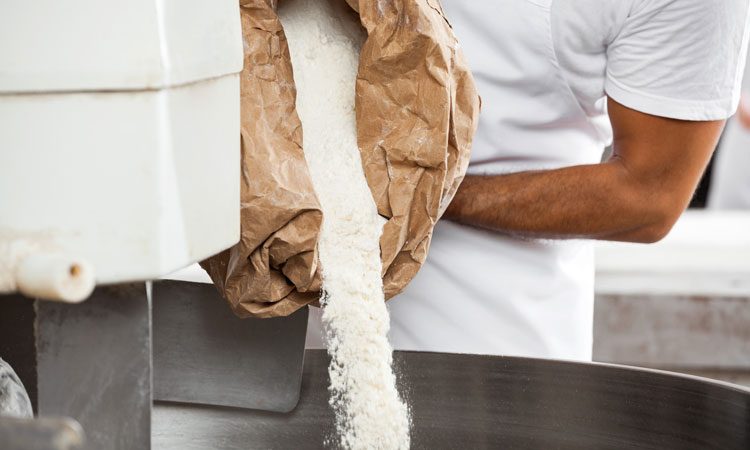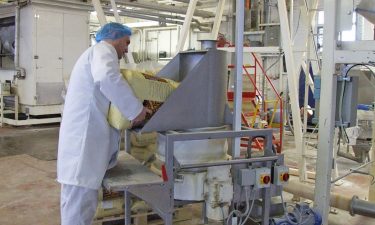Choosing the right conveyor for bulk bakery ingredients
- Like
- Digg
- Del
- Tumblr
- VKontakte
- Buffer
- Love This
- Odnoklassniki
- Meneame
- Blogger
- Amazon
- Yahoo Mail
- Gmail
- AOL
- Newsvine
- HackerNews
- Evernote
- MySpace
- Mail.ru
- Viadeo
- Line
- Comments
- Yummly
- SMS
- Viber
- Telegram
- Subscribe
- Skype
- Facebook Messenger
- Kakao
- LiveJournal
- Yammer
- Edgar
- Fintel
- Mix
- Instapaper
- Copy Link
Posted: 20 August 2019 | Chris Brennan - Technical Sales Manager at Spiroflow | 1 comment
There are many bulk material handling equipment solutions to solve processing challenges faced by bakery manufacturers. Chris Brennan from Spiroflow highlights some available options.


Inflated labour costs, operational errors, cross-contamination and concerns over workers’ health has safety, has seen the bakery sector introduce increased levels of specialist equipment and automation to provide more efficient handling solutions.
Before advancements in technology, ingredient receiving and transferring to various stages of the production process was done manually; nowadays there is a wide variety of bulk material handling equipment available to solve many of the processing challenges faced by bakery manufacturers.
Here are some of the options available, together with an insight on testing and monitoring of your ingredient handling equipment.
Flexible screw conveyors
Certain bakery products lend themselves more to automated bulk handling solutions than others. Whereas minor ingredients are typically handled manually or via microdosing systems installed to improve the scaling accuracy of micro and minor ingredients, the movement in bulk of flour and sugar for example, can present a number of production challenges, making them more suitable for an automated conveying solution, such as a flexible screw or aero-mechanical conveyors.


A flexible screw conveyor is ideal for conveying flour, though what type of spiral to is dependant on the type of flour.
Flour, due to its many variations, can also present a series of issues such as hygiene, dust containment, blending and batching. A flexible screw conveyor, having only one moving part – the spiral – constantly remixes as it conveys making it ideal for conveying flour. Depending on what type of flour is being used will depend on which spiral will be most suitable, however, for standard flours the round screw would work best.
The flexible screw spiral in the tube will rotate round and can convey the flour as a mass even at an angle. This type of conveyor works particularly well on products such as flour where degradation is not an issue. Most flexible screw conveyors can come with a drop out trap, quick release flanges and a reverse bung for cleaning which helps to make it a very hygienic flour conveyor.
In practice, iconic biscuits and crackers brand, Jacob’s Bakeries Ltd, use a flexible screw conveyor to feed bags of brown flour directly into their mixer, helping to keep their manufacturing process reliably fed.
Powdered sugar can also cause challenges as it is being conveyed due to it being highly flammable and explosive. It is therefore critical that a conveyor system is selected to eliminate this risk and that measures are taken in line with the European ATEX Directive.
Furthermore, powdered sugar tends to pack and cake as it is conveyed so further flow aids may be necessary to help with the discharging process.
Granulated sugar, on the other hand, is an abrasive material. This means the conveyor must be capable of withstanding the wear that the sugar will create as it grates against the sides of the conveyor. Just like powdered sugar, granulated sugar is highly combustible and potentially explosive and will ignite at high temperatures.
It is essential, therefore, that any conveyor is designed to prevent dust emissions and static buildup while also eliminating any possible source of ignition. The flexible screw works well with combustible materials as it is always full of product, preventing an explosive atmosphere.
Sugar is a hygroscopic material, meaning it will absorb any moisture it comes into contact with. Flow aids to ensure complete discharge of the sugar from the conveying system may additionally be required.
Aero-mechanical conveyors
An alternative to the flexible screw conveyor is the aero-mechanical conveyor, which creates an airstream that moves the product up the tubes along with high-speed discs and a rope. Flour is conveyed in the air stream created by the rope and discs in the tube where the product is handled gently.
This conveyor is a great choice for conveying flour because any dust created during conveying will be contained within the conveyor, thereby reducing the risk of explosions caused by static build-up and the conveyors can be ATEX compliant.
This conveyor is airtight, runs quietly and with minimal energy, which also makes it a superior choice for conveying larger volumes of sugar. Providing a more gentle conveying option, it is perfect for products like sugar that require minimal degradation.
An aero-mechanical conveyor provides a range of operational benefits when manufacturers are looking to minimise product spillage and possible product contamination, as well as increase equipment ‘cleanability’ and operator productivity.
Product testing
In selecting the right conveyor for bulk bakery ingredients, a good product test is crucial to ensure that the right choice is made and any future misapplication issues in the field can potentially be avoided.


When choosing the right conveyor for bulk bakery ingredients, look for conveyor suppliers with a materials testing laboratory and machine test facilities.
Look for conveyor suppliers with a materials testing laboratory and machine test facilities, which should be equipped with a complete range of conveyors, as well as bulk bag fillers and bulk bag unloaders. A good testing facility will provide comprehensive scientific product analysis on bulk solids or powder, such as the bulk density and particle size.
Ideally, a product should be tested if one or more of the following applies:
- A conveyor or machine is being purchased that hasn’t been used before or a new product is being used on an old system. Not all materials behave the same way on different conveyors. To ensure that the correct conveyor type is being purchased for a product, a test will show how it behaves
- A product is characterised as ‘difficult to handle’. If it is friable, sticky, hygroscopicor that tends to cake or pack, this can be difficult to handle
- A new machine supplier is being used for the first time. Any reputable seller of conveying, discharging and unloading equipment will recommend having a materials trial to avoid any issues with the application
- A certain throughput needs to be achieved. If so, it is advisable that the machine is tested to provide an accurate determination of the actual throughput expected.
Testing should be conducted for the following:
- Blending and mixing – segregation of blends and mixes can be a problem in conveying, so a test can assess how or if a product will segregate
- Rate of flow – ingredients can vary greatly in their flow characteristics. Some ingredients will pack or cake whereas others tend to fluidise when moved. Machine testing will help to determine the flow of a material
- Particle properties – bulk solid bakery ingredients can vary greatly in their particle composition and size, shape and density so understanding the characteristics of a product is a key component of equipment design and choice.
What’s next?


Manufacturers are turning to remote monitoring to collect and analyse data from their machines.
Given that manufacturers base their profitability on having an accurate, high quality and reliable production output, clearly it is imperative that automated material handling equipment is well maintained and monitored – if a machine stops working in the middle of a shift and there are no critical spare parts on-site, long delays can occur which can be expensive.
Manufacturers are therefore increasingly turning to remote monitoring to provide them the ability to collect and analyse data from their machines and develop a program for predictive maintenance, as well as pinpointing potential operational bottlenecks.
Remote monitoring is not just about machine efficiency, is also has clear health and safety benefits. Workplace safety is essential to achieving optimal operation, avoiding substantial production interruptions and most importantly, protecting employees.
It can provide site-wide visibility of equipment, allowing management to view key indicators in not only production, but also in safety compliance by being able to spot possible safety gaps in their process.
And finally…
This an insight on just two pieces of conveying equipment, but there are many other pieces of ingredient handling equipment, such as tubular cable drag conveyors, drag chain conveyors, bulk bag fillers, bulk bag unloaders (super sack unloaders), loss-in-weight or gain-in-weight systems, and custom processing solutions, to name but a few.
For any bakery manufacturer looking to invest in materials handling automation, the key to purchasing the right tools for the job lie in testing and finding an experienced supplier, who can provide appropriate professional support and advice.
Biography
Chris Brennan is employed by Spiroflow as a technical sales manager. He works on high profile projects and manages a number of key accounts. Possessing an in-depth understanding of all powder handling equipment, he is instrumental in the R&D side of the business, often visiting customer sites to help understand their problems and working closely with sales managers to find suitable solutions.
Related topics
Equipment, Food Safety, Processing, Product Development, Robotics & automation, Technology & Innovation








Great information from Chris here. There is more information on the website about each of the conveyors mentioned for bulk bakery ingredients here: https://www.spiroflow.com/equipment/conveyor-solutions/